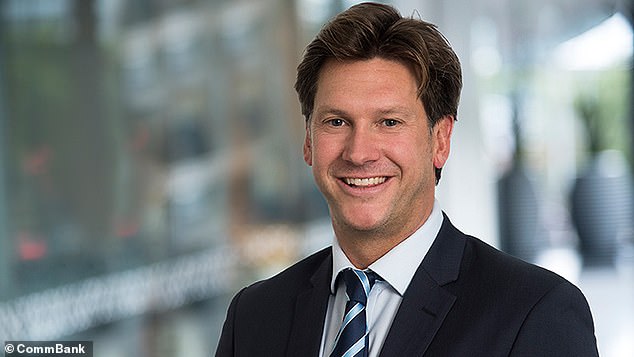Commonwealth Bank drop huge prediction for Aussies with a mortgage
- Commonwealth Bank will omit the rate cut in December
The Commonwealth Bank is now advising borrowers to abandon their hopes of a rate cut before Christmas, despite a big drop in inflation.
Headline inflation – known as the consumer price index – fell to a three-year low of 2.8 percent in September.
This was a big drop from the annual pace of 3.8 percent in the June quarter, based on one-time electricity rebates of $300 and a sharp drop in gasoline prices to $1.80 per liter.
The CPI is now exactly within the Reserve Bank of Australia’s target of 2 to 3 percent for the first time since March 2020.
Inflation has been highly volatile since the pandemic, falling below target during lockdowns before rising to a 30-year high due to supply constraints and pent-up demand for services.
This meant that headline inflation during the September quarter, including volatile price items, was at its lowest level since the March 2021 quarter, when Melbourne was in lockdown.
But Commonwealth Bank head of Australian economics Gareth Aird has revised his forecast that the RBA will now cut rates in February instead of December.
“The result is that we no longer expect the RBA to cut cash rates in December 2024,” he said.
The Commonwealth Bank is now advising borrowers to abandon hopes of a rate cut by Christmas despite a big drop in inflation
“Instead, we anticipate a 25 basis point interest rate cut in February 2025.”
The Commonwealth Bank, Australia’s largest home lender, revised its forecast as underlying inflation – known as the trimmed average – was still too high at 3.5 per cent, down from 4 per cent.
This measure excludes volatile price items – such as petrol, fruit and vegetables and electricity discounts – to achieve an average increase in consumer prices.
An IFM Investors chart published on Wednesday also showed that underlying inflation in Australia is higher than comparable core inflation levels in the US, UK, New Zealand, Canada and the European Union, all of which have increased rates this year reduced.
Another underlying Australian inflation measure, known as the weighted median, yielded an even higher reading of 3.8 percent.
This also excludes volatile items to find an average price increase for more commonly sought after goods and services.

Commonwealth Bank head of Australian economics Gareth Aird has revised his forecast that the RBA will now cut rates in February instead of December
The Australian Bureau of Statistics’ quarterly inflation data, released on Wednesday, also showed services inflation rose 4.6 percent in the year to September, while goods inflation rose a lesser 1.4 percent.
CBA has now joined the other Big Four banks – ANZ, Westpac and NAB – in predicting a quarter of a percentage point rate cut in February.
This would see the RBA cash rate fall to 4.1 per cent for the first time since November 2023, when rates rose for the 13th time since May 2022.
While headline inflation looks good, the lower figure was based on one-off factors such as the federal government’s $300 electricity rebate for 2024-25 and Queensland’s $1,000 rebate on top.
The Reserve Bank is widely expected to leave interest rates unchanged next Tuesday, at a 12-year high of 4.35 percent.
Governor Michele Bullock will announce a decision at 2.30pm Sydney time, half an hour before the Melbourne Cup.
While Australia focuses on a horse race, she will hold a media conference at 3:30 p.m.
